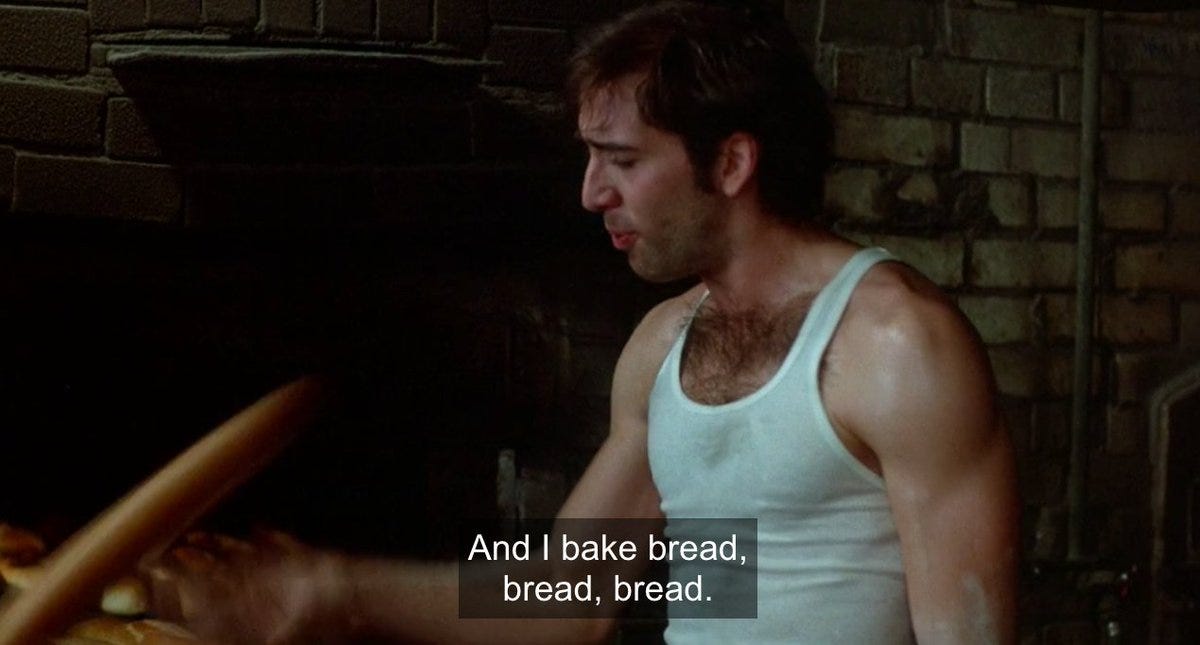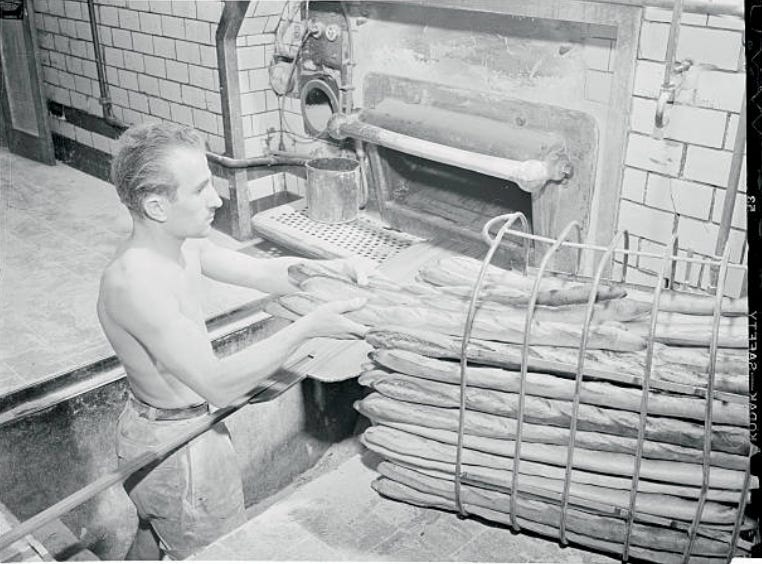I was having coffee with a friend last week when they started telling me about this restaurant they had gone to and how everything was “perfect...except for one thing that ruined it for me.”
I was on the edge of my seat. Did they take too long to serve the drinks? Was a fly in the soup? Was the kitchen staffed entirely by rats?
“You had to pay for bread.”
My friend had a look on their face. It was a very can you believe that garbage sort of stare that put me in a tough position because I could tell that they wanted me to agree with them and go on one of my rants. They wanted me to be a comrade, but I just couldn’t march into battle with them. I told them I was sorry, but I’d given the topic a lot of thought, and then started telling my friend a story about a bread baker I’d heard of back in the 1980s who had a shop in Brooklyn. He’d had a horrible accident that took his hand and led to a personal downfall. His whole life fell apart, but he kept baking bread because, as the handsome Italian baker would point out, bread is life. Whenever I sat down to eat and there was a price attached to the bread and butter, I’d pay it. I’d do it because I love carbs, but also for that baker. His name was Ronny Cammareri.
My friend looked stunned. It turns out that they’ve never seen Moonstruck. Before I told them I couldn’t talk to them again until they changed that, I explained the reason why I pay for bread in a restaurant without kvetching, and Nicolas Cage’s sweaty, brooding, opera-loving character from Norman Jewison’s 1987 classic actually did have something to do with it.
I come from a carb-loving clan; the ol’ Diamond family tree is filled with a lot of can we get a bread basket refill types. Legend has it that my great-great-great (?) grandfather was a baker who married off my great-great grandma to a guy with a lot of chickens (I’m guessing his name was Moishe the Chicken Owner) just so he could get a good discount on eggs to make more loaves of challah. I had a great uncle who was fluent in Italian, which I always figured was something he’d picked up during the war or because nobody knew what he did for a living but he always carried a wad of cash the size of a softball and had a pistol strapped to his ankle. I later learned it was because he worked at an Italian bakery as a kid and would only eat bread baked by people who spoke the language.
I appreciate that great uncle’s brand of snobbery, and I’ve grown to relate to it over the years. When I was a kid, I would take slices of white bread, and break off little pieces that I’d ball up to eat. It was a favorite snack of mine from the ages of 9 until 12. When I was a teenager, the Italian fast food chain (what a terrible thing to even type) Fazoli’s opened up near me when I was giving veganism a go. I was probably the skinniest I’ve ever been in my life simply because I didn’t know what I could and couldn’t eat, but the Fazoli’s garlic bread was vegan-friendly, cheap, and I was young enough to convince myself that eating them constituted an entire meal. To this day, I’ll still gladly eat the pizza crust you don’t want. I don’t want anything going to waste, but I also do a really good job of convincing myself I’m not full.
I have crushed many baskets of bread in my life, sometimes in minutes. Looking back, I believe that I could have done without about 85 percent of it, but I’m a habitual fill-up-on-bread person, and it’s something I know is done out of anxiety and not because I’m a fan of the free baguette that had previously been living in the kitchen freezer for the last week. To paraphrase Fat Bastard, I can't stop eating bread. I eat bread because I'm anxious, and I'm anxious because I eat bread. It's a vicious cycle. The amount of bread I used to eat wasn’t healthy, and the worst part was that most of it was crap. I didn’t even get pleasure out of eating it, but some muddy gurgle of a voice from the furthest edges of my mind would go “Morrrre breeeeead. Must have morrrree,” so I’d grab another piece. I didn’t really want it, and man can’t live on bread alone (or so I’m told) so I didn’t need it.
Thankfully, digging into my food anxieties with my shrink lined up with the rise of restaurants offering bread—if the customer was willing to pay for it. I don’t know if there’s a definitive first place that did that, but I’d say around 2015 it had become enough of a regular topic of conversation that it was a thing. People talked about it the same way my friend who loved everything about the restaurant…except paying for the bread. We’d been deprived of free bread, and most people I talked to chalked it up to greedy restaurant owners looking to make an extra five or six bucks off a plate of sourdough. The conversation slowly drifted into the economy is so bad that even bread isn’t free anymore territory, and eventually, we got to where we are now: everything is expensive.
But paying for bread is what made me appreciate eating it more. It reminded me of just how much we take everything for granted in America, and how we turned bread into this tasteless, soulless thing you use to sandwich equally tasteless and soulless meat and cheese between to make a sandwich. Wonder Bread went nationwide in the 1930s with its sliced white loaves, and it’s been all downhill from there. It just so happens that around the time I remember people talking about how they had to pay for bread at a restaurant, I also recall the quality of bread going up. Sometimes, it was because the restaurant started ordering their bread from better bakeries instead of getting an account from a place with a name like Thompson Wholesale Bread and Livestock Feed for their loaves. Either that was the reason for the price increase, or the restaurant made the choice to bake their own bread. Both of those things cost money, and if a place is willing to pay for a baker to make fresher and better bread, then I’ll give it a chance. If they pair it with excellent butter or olive oil, that’s a bonus. It also frees them up to do things differently.
The other night when Emily and I went to dinner at Strange Delight in Fort Greene, I mentioned how I’d loved my first time eating there, but had been a little skeptical of ordering one of the “loaf” sandwiches. The very New Orleans-inspired menu had plenty of other things I could fill up on, and I assumed that their sandwich was constructed like a po’ boy I’d get when I visit the Cresent City. And if you’re like me and you go make eating one of those things the first thing you do when you get into town, you know how hard it is to get back up even with the promise of Sazeracs and frozen Hennessey coladas you can drink in the streets. But Emily wanted to try it and mentioned it was served on milk bread, not a crusty piece of French bread like I get at my beloved Frady’s in the Bywater.
“That’s interesting,” I said to the bartender as he patiently waited for us to finish our orders. “I love milk bread but don’t see it a lot around here.”
That’s because not many places have the good sense to employ somebody to bake it for them. The bartender told me Strange Delight did. And because they go through the trouble to make milk bread that is just right for their sandwiches, the ones we ordered along with all the other food didn’t have me waddling out of the restaurant and into the Brooklyn night like I was the Stay Puft Marshmallow Man. I even had a little room left over for the bread pudding that was served, yup, on the milk bread.
That’s ultimately why I’m fine with paying for bread at dinner. When I get a croissant or bagel in the morning, I pay for bread and don’t make a stink about it. So why should adding it to my bill at night be any different? I do it and think about how nice it would be if more places started upping their bread standards, and then maybe we could start a little carbohydrate revolution. Other places would have to hire bakers to keep up, and we’d all start taking bread a little more seriously and not just something to get filled up on. Finally, that Italian baker in Brooklyn who lost his hand in a bread slicer could maybe find some peace.






It sounds to me like your pal is stuck in some long-ago decade. And I mean long-ago. Back in the late seventies when I worked in SoHo, the restaurant served very good whole-grain bread for the table, but most of the people didn't eat it or even want it, and we had to throw it out. Eventually the owners decided to charge all of 50 cents for a basket of bread. I do not recall more than a handful of people ever complaining or even remarking on the charge.
You are absolutely correct about the dismal state of sliced, supermarket bread in 2024. It's pretty awful aside from the fancy Bread Alone loaves. OK, and the odd Pepperidge Farm loaf here and there. Luckily there are traditional bakeries around, like Calandra's in the Jerz. Their breads are pretty great.